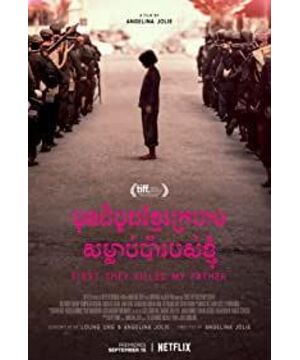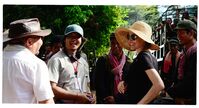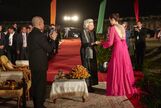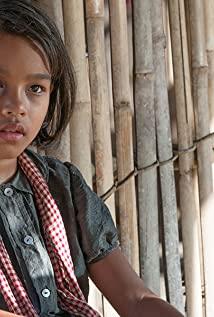There's a movie recently that I've been really looking forward to. Not only because it was adapted from a survivor's memoir, but because it felt too real. It is so real that everyone will feel a heavy sadness after reading it. (Maybe this is also the charm of "true events" movies.) "They Killed My Father First: Memoirs of a Cambodian Daughter" | 2017 It is worth mentioning that this is directed by Hollywood superstar Angelina Jolie Fourth work. I admire this female director very much. When domestic directors are making romance films and youth films are earning box office, this white woman who has already succeeded in the world does not want to make money or indulge in pleasure, but cares and sympathizes with the suffering in this world. , made this film, it is respectable. (Julie is on the set) The background of the film is the Khmer period (the old name of Cambodia), the collapse of the Lon Nol government supported by the United States, and the people have turned to the Khmer Rouge (a political party organization), thinking that they have found their ideal home. But they don't know that this is just going from one suffering to another abyss. During the three years and eight months under the jurisdiction of the Khmer Rouge, at least 3 million people in Cambodia died of famine, work and rest, diseases and other abnormal causes of death. This history is also known as one of the "biggest man-made disasters in the 20th century" . And the little girl Loung Ung (Chinese translation: Liang), as a survivor, used her perspective to reveal the truth behind this bloody storm for us. Liang's family is well-off, his father is a former government official, and there are 6 siblings in the family. But soon the Khmer Rouge occupied the capital Phnom Penh, and the family had to pack up and flee. There were constant searches on the way to escape, and Liang's father had to hide his identity (he was a former government officer and belonged to the crackdown category) and began to flee. They were sent to labor camps in the countryside, wearing black clothes and cutting their hair short, working day and night, and because of food shortages, people continued to die miserably. The elder sister, who is three years older than her, was beaten by the administrator because she was too hungry and stole some beans. The most tender part of the whole film is that the father who came back from the night work secretly stuffed them with a small handful of rice grains and a few grasshoppers, and everyone distributed them to eat. This is his only ability as the head of the family, and it is also the father's total love for this family. But soon death came, and two armed soldiers took the father away, saying that he was going to repair a bridge nearby. Father's back is so decisive, let Loung Ung cried "Dad" without looking back. In the face of extreme hardship, the mother let several children escape from different directions, and she took the youngest daughter to die in peace. Liang and his brother and sister were sent to a new labor camp, and were selected by female officers to become mine-burying soldiers. On the night of the Vietnamese army raid, she took advantage of the chaos to join the escape team, escaped the hail of bullets, reunited with her brother and sister, and arrived at a refugee camp in Thailand. At this point, the film comes to an end. I have an honest opinion about this film. Those who have known this history know that in the hellish Cambodia and the murderous Khmer Rouge, Julie did not even photograph one ten thousandth of the evil of this disaster. But I still admire this female director, she dares to shoot for nothing else, she is willing to shoot! She moved this history, which was too heavy to face, to the big screen and displayed it in this peaceful age, telling the public that tyranny, dictatorship, and war really happened and should not be forgotten. In fact, a movie is a piece of history. There is a scene in the film where a Khmer Rouge soldier was captured by the refugees, everyone ran to vent their anger, only Liang Jing looked at him, remembering that his father was also tied up and slaughtered like this. The picture freezes on the soldier's face, as if he is ashamed, as if he is sorry for her and the victims who died at his hands in this movement. But the real history is much crueler, sorry? remorse? I'm afraid not. Jolie chose such a story that is easily forgotten by the world, focusing on and reflecting on the war from the perspective of children. It may also be in memory of the lives lost, or like the Loung Ung, the survivors of the war. To make the world remember this real man-made disaster. Like Ung, a survivor of the war. To make the world remember this real man-made disaster. Like Ung, a survivor of the war. To make the world remember this real man-made disaster.
View more about First They Killed My Father reviews









